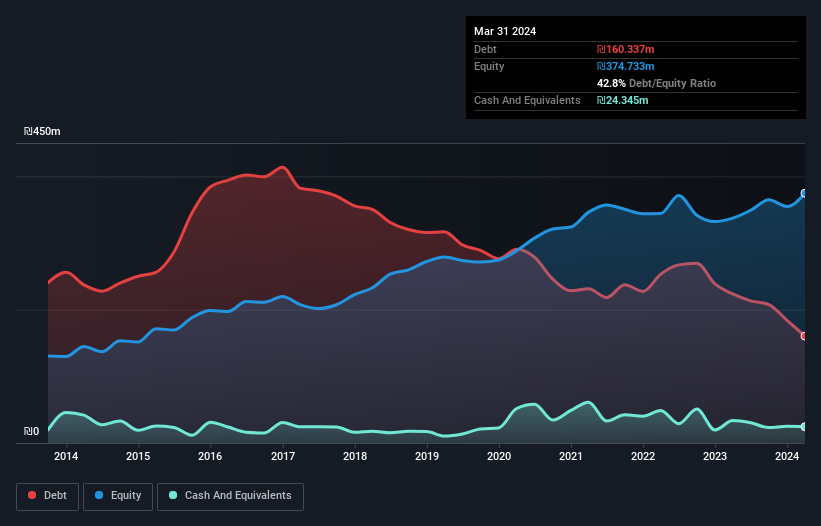- Israel
- /
- Medical Equipment
- /
- TASE:NISA
We Think Nissan Medical Industries (TLV:NISA) Can Stay On Top Of Its Debt

Legendary fund manager Li Lu (who Charlie Munger backed) once said, 'The biggest investment risk is not the volatility of prices, but whether you will suffer a permanent loss of capital.' So it seems the smart money knows that debt - which is usually involved in bankruptcies - is a very important factor, when you assess how risky a company is. We can see that Nissan Medical Industries Ltd (TLV:NISA) does use debt in its business. But the real question is whether this debt is making the company risky.
When Is Debt Dangerous?
Debt is a tool to help businesses grow, but if a business is incapable of paying off its lenders, then it exists at their mercy. Part and parcel of capitalism is the process of 'creative destruction' where failed businesses are mercilessly liquidated by their bankers. However, a more common (but still painful) scenario is that it has to raise new equity capital at a low price, thus permanently diluting shareholders. Of course, debt can be an important tool in businesses, particularly capital heavy businesses. When we examine debt levels, we first consider both cash and debt levels, together.
See our latest analysis for Nissan Medical Industries
What Is Nissan Medical Industries's Debt?
The image below, which you can click on for greater detail, shows that Nissan Medical Industries had debt of ₪160.3m at the end of March 2024, a reduction from ₪223.5m over a year. On the flip side, it has ₪24.3m in cash leading to net debt of about ₪136.0m.

How Strong Is Nissan Medical Industries' Balance Sheet?
We can see from the most recent balance sheet that Nissan Medical Industries had liabilities of ₪215.2m falling due within a year, and liabilities of ₪118.7m due beyond that. Offsetting this, it had ₪24.3m in cash and ₪113.5m in receivables that were due within 12 months. So its liabilities total ₪196.1m more than the combination of its cash and short-term receivables.
This deficit casts a shadow over the ₪127.2m company, like a colossus towering over mere mortals. So we'd watch its balance sheet closely, without a doubt. After all, Nissan Medical Industries would likely require a major re-capitalisation if it had to pay its creditors today.
We measure a company's debt load relative to its earnings power by looking at its net debt divided by its earnings before interest, tax, depreciation, and amortization (EBITDA) and by calculating how easily its earnings before interest and tax (EBIT) cover its interest expense (interest cover). The advantage of this approach is that we take into account both the absolute quantum of debt (with net debt to EBITDA) and the actual interest expenses associated with that debt (with its interest cover ratio).
Looking at its net debt to EBITDA of 1.3 and interest cover of 3.6 times, it seems to us that Nissan Medical Industries is probably using debt in a pretty reasonable way. But the interest payments are certainly sufficient to have us thinking about how affordable its debt is. Pleasingly, Nissan Medical Industries is growing its EBIT faster than former Australian PM Bob Hawke downs a yard glass, boasting a 2,271% gain in the last twelve months. There's no doubt that we learn most about debt from the balance sheet. But it is Nissan Medical Industries's earnings that will influence how the balance sheet holds up in the future. So if you're keen to discover more about its earnings, it might be worth checking out this graph of its long term earnings trend.
Finally, a company can only pay off debt with cold hard cash, not accounting profits. So the logical step is to look at the proportion of that EBIT that is matched by actual free cash flow. During the last three years, Nissan Medical Industries generated free cash flow amounting to a very robust 93% of its EBIT, more than we'd expect. That puts it in a very strong position to pay down debt.
Our View
Both Nissan Medical Industries's ability to to convert EBIT to free cash flow and its EBIT growth rate gave us comfort that it can handle its debt. But truth be told its level of total liabilities had us nibbling our nails. We would also note that Medical Equipment industry companies like Nissan Medical Industries commonly do use debt without problems. Looking at all this data makes us feel a little cautious about Nissan Medical Industries's debt levels. While we appreciate debt can enhance returns on equity, we'd suggest that shareholders keep close watch on its debt levels, lest they increase. There's no doubt that we learn most about debt from the balance sheet. But ultimately, every company can contain risks that exist outside of the balance sheet. Be aware that Nissan Medical Industries is showing 2 warning signs in our investment analysis , and 1 of those can't be ignored...
Of course, if you're the type of investor who prefers buying stocks without the burden of debt, then don't hesitate to discover our exclusive list of net cash growth stocks, today.
Valuation is complex, but we're here to simplify it.
Discover if Nissan Medical Industries might be undervalued or overvalued with our detailed analysis, featuring fair value estimates, potential risks, dividends, insider trades, and its financial condition.
Access Free AnalysisHave feedback on this article? Concerned about the content? Get in touch with us directly. Alternatively, email editorial-team (at) simplywallst.com.
This article by Simply Wall St is general in nature. We provide commentary based on historical data and analyst forecasts only using an unbiased methodology and our articles are not intended to be financial advice. It does not constitute a recommendation to buy or sell any stock, and does not take account of your objectives, or your financial situation. We aim to bring you long-term focused analysis driven by fundamental data. Note that our analysis may not factor in the latest price-sensitive company announcements or qualitative material. Simply Wall St has no position in any stocks mentioned.
About TASE:NISA
Nissan Medical Industries
Through its subsidiary, engages in the manufacturing and marketing of spunlace non-woven fabrics in the United States, Canada, Europe, and Israel.
Excellent balance sheet established dividend payer.
Market Insights
Community Narratives




